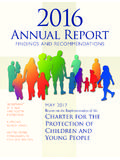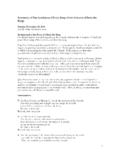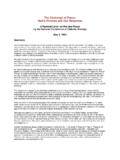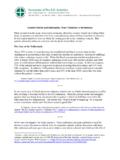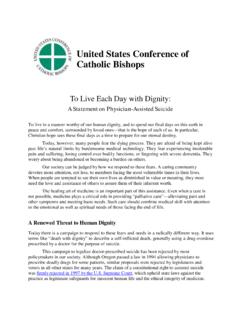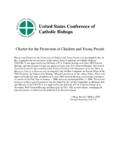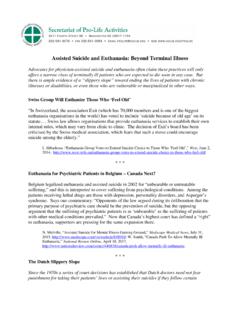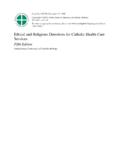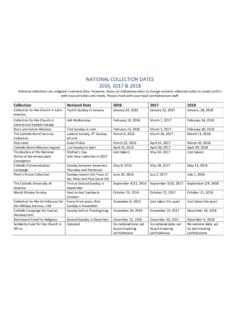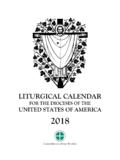Transcription of Questions and Answers Regarding the Canonical …
1 Questions and Answers Regarding the Canonical process for the resolution of Allegations of Sexual Abuse of Minors by Priests and Deacons Q: Does the Church have its own laws against the sexual abuse of minors by members of the clergy? A: Yes, the Church has long had laws on the books that address this crime. Even before the majority of the Church laws were collected into a single code of laws (in 1917 and in 1983), sins against the Sixth Commandment with a minor were also considered criminal acts. From 1917. onwards, the Church promulgated concise legal norms that stated this and that imposed penalties on clergy that offended in this terrible way. Q: Which Church authority is responsible for addressing these offenses? A: In April 2001, Pope John Paul II issued a law stating that, from then on, the Congregation for the Doctrine of the Faith (CDF) in Rome, headed at the time by Cardinal Ratzinger, the future Pope Benedict XVI, would have sole Church authority over this crime.
2 The Congregation for the Doctrine of the Faith is one of the offices that assist the Pope in fulfilling his mission as Supreme Pastor of the Catholic Church. Prior to 2001, the crime was generally to be dealt with on the local level by the diocesan bishop. The CDF would have been involved if the offense had occurred on the occasion of the celebration of the Sacrament of Penance (confession). Otherwise, the case would have gone for a second hearing (appeal from the diocese) to the Congregation for Clergy or the Tribunal of the Roman Rota, offices that assist the Pope, depending on how the allegation had been resolved on the local level. Q: What does canon law now require a bishop to do when he receives an allegation of sexual abuse of a minor committed by a cleric (priest or deacon)? A: The Code of Canon Law stipulates that the first steps after receipt of an allegation of the commission of an ecclesiastical crime are usually taken by the local bishop.
3 If the priest against whom an allegation is brought is a member of a religious order, his superior might take the first steps instead. Any allegation that has the semblance of truth (it is not manifestly false or frivolous) undergoes what is referred to as a preliminary investigation. During the preliminary investigation, the accused enjoys the presumption of innocence and his good name must not be illegitimately harmed. According to the Essential Norms, which constitute law on sexual abuse of minors for the dioceses of the United States, the investigation should be conducted promptly and objectively. The Essential Norms also require the bishop to follow all civil reporting laws when the allegation concerns the sexual abuse of minors. Church officials are also to cooperate with civil authorities in their own investigations. Moreover, the bishop exercises his power of governance in other ways to make sure no harm comes to children during the phase of the preliminary investigation.
4 Q: Does the Holy See become involved at this point? A: Usually not. The Congregation for the Doctrine of the Faith does have sole competence in resolving allegations of sexual abuse of minors committed by clerics. But this competence does not yet kick in. The Congregation exercises its authority once a case is referred to it by the local bishop. The bishop makes the decision as to whether a case will be referred. In most instances, unless the allegation proves manifestly false, it must be reported to the Congregation. The Essential Norms require a bishop to report all cases to the CDF once he has sufficient evidence that the sexual abuse of a minor may have occurred. The Congregation would normally have knowledge of the accusation only when it is reported to the Congregation by the bishop or religious superior. Q: How does the preliminary investigation into the allegation take place?
5 A: The bishop appoints an investigator. The investigator has the obligation and authority to collect the facts and circumstances surrounding the allegation so that the bishop can make a determination about its truthfulness and what further action he would recommend to the Congregation for the Doctrine of the Faith. The investigator often uses the expert services of others to assist with the investigation. In the United States, the bishop also makes use of the services of his Diocesan Review Board, a panel of experts, to help him review the allegation and associated information. The bishop and investigator are careful not to interfere with any civil investigation into the accusation that might take place. The investigator and others who assist in the investigation may be laypersons. Q: Does the bishop always report the case to the Congregation for the Doctrine of the Faith?
6 A: The general rule is that all cases are referred to the Congregation. The exception, as noted above, would be when the allegation is manifestly false. In other words, if there is any semblance of truth at all to the allegation, the bishop seeks the intervention of the Congregation. If he is in doubt about the semblance of truth, he may seek the assistance of the Congregation to assist him in coming to a decision. Q: What happens after the bishop reports the results of the preliminary investigation to the CDF? A: The CDF will review the material and make a decision on what the next steps might be. The decision is based on the material gathered during the investigation and on the observations and recommendations of the bishop Regarding the allegation and what might be a suitable way to address it. The next steps could include several options depending on what materials the CDF.
7 Received. Among them, the CDF could authorize the bishop to hold a trial locally or to address the allegation through a simplified, administrative penal process . It could also hold a trial in Rome at the offices of the CDF. In the clearest and most egregious cases, the CDF could refer the matter to the Pope for immediate dismissal of the cleric (see below for more on this). It might also happen that more information is needed before a decision can be made. This would require the bishop to gather the information and forward it to the CDF. The CDF could also confirm, if the facts and circumstances warranted it, that there is not sufficient evidence of the commission of an ecclesiastical crime. Q: Is the priest or deacon still in ministry while all of this is being considered? A: No. A bishop may at any time withdraw a cleric from active ministry pending the outcome of an investigation of the allegation.
8 This is done primarily to assure that children are not in danger should it prove true that the cleric had committed acts of abuse. At the same time, it must be emphasized again that the cleric enjoys the presumption of innocence. This should be made clear by the diocese to the public. If the allegation is unfounded, the bishop must strive to repair any illegitimate damage to the good reputation of the priest or deacon. Q: Does the Pope become involved in the consideration of how best to proceed with addressing an allegation? A: No. The CDF handles these cases. The Pope does not supervise the daily activities of the Congregation nor become involved in particular cases as they are being processed. Q: What does a sexual abuse trial look like when conducted under canon law? A: It is similar to criminal trials that take place in some European countries that follow a different legal tradition than that of the United States.
9 Because of this, the canon law trial will not appear similar to those we might be familiar with in the United States. A panel of three judges hears the case. The accused has a canon lawyer to assist in his defense. The prosecutor is referred to as the promoter of justice. Tribunals in both a diocese and the CDF have promoters of justice. Witnesses are called to testify, including possible victims. The judges, rather than the canon lawyers, question the witnesses. Other forms of evidence are gathered, such as letters that might have been written. After this the defense canon lawyer and promoter of justice submit written arguments of their sides of the case. The judges then review the evidence carefully, deliberate together, and issue a verdict. If the finding is for guilt, the judges also impose a penalty (see below for types of Church penalties). Q: Is the verdict open to appeal?
10 A: Yes. Once the tribunal issues its decision, the decision goes to the CDF. Both the verdict (whether for or against guilt) and penalty (if the verdict for guilt) may be appealed by either the accused or the promoter of justice of either the diocese or the CDF. If no appeal is lodged within a certain time frame, the sentence is final. If an appeal is lodged, another hearing of the case will take place by an appellate panel of judges. This may occur again at the CDF, or, with authorization of the CDF, at the local level. Q: Does the Pope have a role in hearing the appeal? A: No. The CDF has its own supreme tribunal. The Pope himself does not sit personally as a judge on the tribunal of the CDF. He has several judicial courts or tribunals that administer justice, one of which is the CDF tribunal. The decision of the CDF in an appeal of a judicial sentence is final. Q: Is a formal trial the only way that allegations of this crime can be resolved as a matter of canon law?
